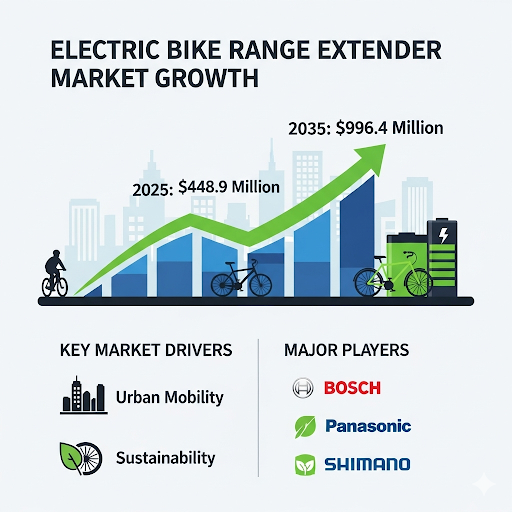The global electric bike range extender market is shifting gears toward strong growth, fueled by urban mobility needs, rising environmental awareness, and consumer demand for longer battery life. Valued at USD 448.9 million in 2025, the market is forecast to reach USD 996.4 million by 2035, expanding at a compound annual growth rate (CAGR) of 8.3%.
For e-bike riders across the world, range anxiety—fear of running out of battery during a trip—remains a major concern. Range extenders, designed to supplement the primary e-bike battery, are proving to be a practical solution. From commuters navigating city streets to cyclists tackling mountain trails, these compact add-ons are reshaping the electric biking experience.
What’s Powering the Demand?
- Urban Mobility and Sustainability – Cities worldwide are investing in eco-friendly infrastructure. With cycling becoming central to green commuting, range extenders allow riders to go farther without relying on cars or public transport.
- Government Incentives – Subsidies and tax breaks for electric mobility, especially in Asia and Europe, are accelerating adoption.
- Technological Breakthroughs – Advances in energy density, fast-charging infrastructure, and lightweight modular systems are making extenders more efficient and consumer-friendly.
- Rising Consumer Expectations – As e-bikes shift from niche to mainstream, riders expect performance that rivals traditional vehicles for commuting, delivery, and leisure.
Market Segments: Who’s Leading the Race?
- By Product:
Battery-based range extenders dominate the market, projected to hold 46.7% share in 2025. Compact, portable, and easy to integrate, these extenders are becoming the preferred choice for both OEMs and aftermarket solutions. - By Technology:
Plug-in range extenders are set to lead with 51.2% share in 2025, thanks to their convenience and compatibility with standard electrical outlets. Their flexibility makes them especially popular for urban riders and delivery services. - By Material:
Lithium-ion batteries remain the backbone of the market, accounting for 59.4% share in 2025. Known for their high energy density and lightweight properties, lithium-ion solutions also benefit from recycling initiatives that enhance their sustainability appeal. - By Application:
Demand spans commuter bikes, mountain bikes, cargo bikes, and folding bikes. Commuters remain the largest group, but adventure and touring cyclists are increasingly seeking longer-range solutions. - By Distribution:
Both online and offline channels are growing, though the online market is expanding faster as consumers look for customizable, easy-to-install solutions.
Global Outlook: Where Growth is Happening
The electric bike range extender market is thriving across regions, but growth patterns vary:
- China (CAGR 11.2%) – China is leading global adoption, supported by government subsidies, mass e-bike production, and a population increasingly dependent on electric mobility. Range extenders are crucial for long commutes and last-mile delivery in congested cities.
- India (CAGR 10.4%) – Rapid urbanization, government support, and growing eco-consciousness are driving demand. With millions relying on two-wheelers, e-bikes paired with range extenders are becoming a cost-effective solution for daily travel.
- France (CAGR 8.7%) – France’s commitment to lowering carbon emissions and building cycling infrastructure makes it a strong growth market. Urban commuters are fueling adoption, while government policies encourage long-term sustainability.
- United Kingdom (CAGR 7.9%) – The UK market benefits from cycling infrastructure investments and rising demand for last-mile mobility. Short-distance commutes, paired with eco-friendly incentives, are driving the uptake of plug-in extenders.
- United States (CAGR 7.1%) – In the U.S., growing demand for sustainable transport and technological innovation in battery design are boosting adoption. Government incentives and the rise of cycling culture in urban hubs add further momentum.
Industry Leaders: Competition on the Horizon
Major players are racing to capture market share by focusing on innovation, partnerships, and energy efficiency.
- Bosch leads with advanced range extender systems designed to maximize efficiency and performance.
- Panasonic Corporation and Shimano emphasize long-lasting battery systems and power management.
- Valeo and TQ-Group target high-performance riders, while Yamaha Motor is integrating extenders into its electric drive systems.
- Startups like Fazua and MAHLE are also gaining traction with compact, lightweight solutions tailored for urban riders.
The competition reflects not just a fight for dominance but also an industry-wide push toward smarter, more sustainable, and consumer-friendly solutions.
Key Challenges on the Road Ahead
Despite the strong growth outlook, the industry faces hurdles:
- High Costs – Range extenders add extra expense for riders who have already invested in premium e-bikes.
- Compatibility Issues – Not all extenders fit all e-bike models, making standardization a challenge.
- Consumer Awareness – While adoption is rising, many potential users remain unaware of how extenders can transform their riding experience.
Industry experts suggest that overcoming these barriers with universal solutions, lower costs, and consumer education will be critical for mass adoption.
Future Trends: Smarter, Lighter, and Connected
The next decade will see range extenders evolve into smarter, more compact devices:
- Smart Connectivity – Real-time monitoring, energy optimization, and app-based controls.
- Lightweight Design – Portable systems that don’t compromise performance.
- Sustainability – Greater reliance on recyclable materials and second-life battery applications.
- Customization – Modular options that allow riders to tailor their bike’s performance based on terrain or distance.
As cities worldwide push for sustainable, congestion-free transport, electric bikes and their range extenders are set to become everyday essentials.
Key Companies Profiled
- Bosch
- Bafang Electric
- Brose Fahrzeugteile
- FAZUA
- Mahle
- Panasonic Corporation
- Shimano
- TQ-Group
- Valeo
- Yamaha Motor
Related Market Data: https://www.futuremarketinsights.com/reports/electric-bike-range-extender-market
